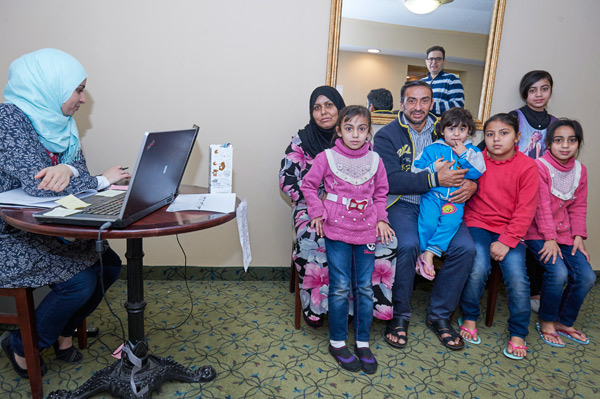By Anita Grace –
“There’s everything in this house. Just everything.”
Marine Armstrong is describing the response of a Syrian refugee girl who arrived in Ottawa in February. With her mother and five siblings, the girl shyly explored a home that had been rented and fully furnished by the group that sponsored them.
Marine is part of a refugee sponsorship group called the Fraser Group, named for the Westboro street on which many group members live. It is one of more than a dozen groups that have formed in Kitchissippi in recent months in order to sponsor refugees. “It’s a lot of work,” she says. “But it’s very rewarding. Once you see them and meet them, it’s very rewarding.”
“I think it’s a concrete way to make a difference in people’s lives,” says Brian Cornelius, Minister of Westboro’s First United Church. First United is currently sponsoring four refugee families, and is also actively supporting 11 other sponsorship groups. “There are many people who want to be engaged, and groups are anxious to work with families directly.”
“A lot of my friends are asking, what can I do? How can I help?” says Amal Hassanein, who is part of a sponsorship group through the Ottawa Muslim Association and the Ottawa Mosque on Northwestern Avenue.
In response to the Syrian refugee crisis, the Canadian government has streamlined the private sponsorship process, and of the 25,000 Syrians being brought to Canada, an estimated 10,000 will be privately sponsored. Private sponsorship involves a group of at least five individuals taking responsibility for supporting refugees in their arrival to Canada and their first year of settlement.
Most private sponsorship groups go through an organization that has already been approved by the government to sponsor refugees, known as a Sponsorship Agreement Holder (SAH). Local SAHs which Kitchissippi groups are partnering with include the United Church of Canada, the Unitarian Congregation, and Jewish Family Services.
“By going through the churches who are Sponsorship Agreement Holders, a lot of the paperwork and administration is already done,” explains Norah Patriquin, a Westboro resident who is involved with a sponsorship group connected to the Kitchissippi United Church. “It’s not an onerous task.”
“It’s a great opportunity to open our doors and open our hearts to others,” she adds.
Norah joined at least 30 others from the sponsorship group to greet their Syrian family at the airport on February 22. The group was waiting at the arrival escalators at the Ottawa Airport with signs in Arabic, and flowers and gifts for the family of three.
The Syrian family was visibly touched by their warm welcome. Speaking in Arabic to a translator, they said were very happy. “We don’t have words to express it.”
Over 1,100 Syrian refugees have arrived in Ottawa in recent months. While some are being welcomed by private sponsorship groups, the majority are government-assisted refugees who are settled through agencies such as the Catholic Centre for Immigrants Ottawa. Many of these refugees are initially placed in temporary housing, such as the Travelodge hotel on Carling Avenue.

Local Community Health Centres (CHCs), including Somerset West and Carlington, have stepped in to provide much-needed medical care. A room at the Travelodge has been converted into a makeshift clinic where staff from Carlington CHC provide primary health care to the 155 refugees currently staying in the hotel. Their work at Travelodge would not be possible without the help and support of South East Ottawa CHC, says Christelle Cleroux, the clinical coordinator.
“We’re noticing a lot of residents with long-standing chronic conditions that haven’t been addressed in quite some time,” adds Christelle. She lists conditions like diabetes, hypertension, blindness, deafness, respiratory infections, as well as mental illness.
As an added challenge, 98% of these refugees do not speak English or French. Cameron MacLeod, Carlington CHC Executive Director, notes that having two nurse practitioners on staff who speak Arabic has been very helpful. He adds that there has been an incredible amount of support from other organizations in the city, from provincial funding, and from individual volunteers. “The number of people stepping up in an excited, enthusiastic way is extraordinary.”
“People have been so forthcoming with money and offers of help,” echoes Denise Bonomo, who is chairing the sponsorship group associated with Kitchissippi United Church. She notes that they easily raised $27,000, through private, individual donations, to cover the start-up costs and living expenses for a year for the sponsored family of three. Immigration and Citizenship Canada recommends that sponsorship groups raise between $12,600 and $32,000, depending on the size of the refugee family, the housing options available for the first year, and the type of government assistance available.
Brian thinks the Syrian refugee crisis has impacted Canadians in a profound way. While many people feel politically powerless, getting involved in sponsoring a refugee family offers a direct, personal engagement. “It touches us viscerally,” he says. “We can actually do something.”
Those interested in assisting refugee families settling in Ottawa, or sponsoring families to come here, can connect with Refugee 613 at refugee613.ca.
Run or walk for refugees
Thousands of refugees and immigrants will be making Ottawa their new home this year. You can help by registering for the Tamarack Ottawa Race Weekend (May 28-29) and joining the Ottawa Community Immigrant Services Organization (OCISO) team of fundraisers.
Your participation ensures new refugees and immigrants feel welcomed and supported in our community. As a thank you, the first 100 runners or walker volunteers who commit to raising over $100 will receive a professional racing shirt.
For more information, please contact OCISO’s volunteer coordinator, David Rain at drain@ociso.org, or visit ociso.org.